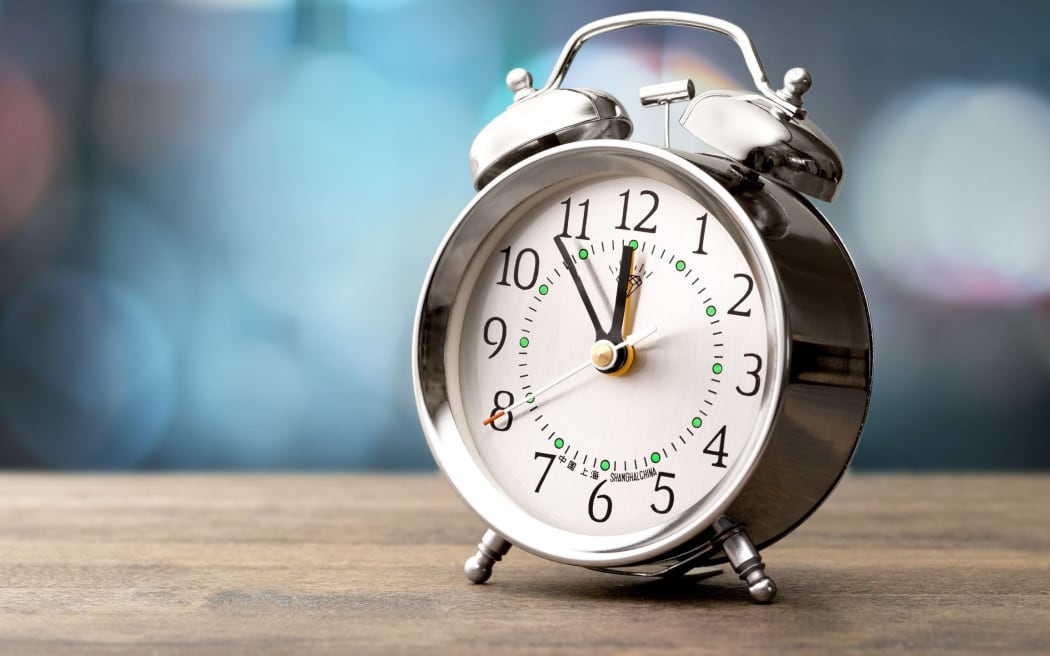Restricting our eating hours could be key to curbing obesity, kidney disease, high cholesterol, bad sleeping, joint pain, possibly even cancer, according to recent research.

Keeping track of the time we eat is key to a healthy diet, research by Dr Satchin Panda suggests. Photo: 123RF
Satchin Panda is a professor at the Salk Institute for Biological Studies and shares his findings about timing and diet in his book, The Circadian Code: Lose Weight, Supercharge Your Energy, and Transform Your Health from Morning to Midnight.
Dr Panda tells Afternoons' Jesse Mulligan his research shows metabolism works best when we line up eating with circadian rhythms.
“We not only have a clock in our brain that regulates when we sleep and when we wake up, there are clocks almost in every cell in our body,” he says.
“These clocks make sure that different hormones, different brain chemicals, digestive juice, even different genes rise and fall at different times of the day.
A right time for everything
He says it’s a simple case of our body not being able to do everything at once.
“When animals are given this yummy food then they tend to eat that food around the clock … it starts to break down their circadian rhythm.

The availability of sweet foods for constant snacking means people or animals are more likely to continue eating all day. Photo: rnz
“Then things that are not supposed to happen together will start to happen together, some of the hormones will start to go up.”
“In a day we cannot eat, sleep, shop, play music, run and swim at the same time, so similarly there are thousands of chemical processes in our body that cannot happen at the same time.
“When we eat our body does two things, it starts to use readily available sugar or carbohydrate as an energy source and then it stores a little bit of food for the overnight fasting period.
“Just like we cannot repair a highway when the traffic is still flowing, we cannot do any of this repair if food is still coming down the intestine, so that’s why there is a very strong evolutionary pressure to divide different functions in our body broadly to daytime or when we eat and more importantly a lot of maintenance, housekeeping is done when we don’t eat.”
Biological recycling

Dr Panda says the eating process disrupts the biological housekeeping our body needs to perform to stay healthy. Photo: bialasiewicz/123RF
The fast recharge overnight accomplishes a lot, he says, with the body breaking down toxins from food and the environment, cholesterol, repairing damage to DNA, “so that we don’t accumulate cancer-causing mutations from these toxins”, and burning some fat.
“And that fuels our brain and makes us more alert so that in the morning although we have a hungry stomach we can still get up and run and fetch food.”
Muscle, gut linings and skin are also repaired.
“Almost every seven to 15 days our gut lining and skin lining turns over.”
Appetite of a mouse
Dr Panda says there’s plenty of evidence to support the idea.
His first experiment on it tested restricting eating hours of mice, based on a study that has been replicated thousands of times with some different variables.
“We took identical set of mice born to the same parents, raised in the same house, had the same microbiome, and divided them into two groups.”
In the typical experiment, one group is given an unhealthy, high-calorie diet and could eat whenever they wanted, the other group is given a healthy diet and can eat whenever they want.

Mice that were fed the same amount as the control group but only within an eight-hour window showed none of the same signs of unhealthy diet, Dr Panda says. Photo: 123rf
Dr Panda’s research changed it up a bit: both groups were given a high-calorie diet - and the researchers were careful to ensure they ate the same amount of calories - but one group was only allowed to eat within an eight-hour window.
“The biggest surprise was at the end of 18 weeks the mice that ate for eight hours ... were completely healthy, they did not become fat, they were not diabetic, they were not obese, they did not have high cholesterol.”
“The result was so surprising that I had to repeat this experiment three times with three different researchers to be very sure, because this was challenging three decades of nutrition.”
The effect is also retroactive, and does not need to be completely consistent.
“We can also take sick mice and we feed them within eight to 10 hours and we can reverse a lot of their diseases.
“We even give them weekends off and they go off their 10-hour or 9-hour schedule and they’re still healthy … they can come back to the zone.”
He says that with testing they found 12 hours of eating was sometimes okay for mice.
“When they go to 15 they’re not healthy anymore.
Fashionable dieting and other human trials

Photo: shalamov/123RF
Dr Panda says evidence that the effect carries over to humans is slowly building up,
“In some new studies where groups of people who are eating, time restricted, within short period or unrestricted but eating the same number of calories they’re also finding just like in mice humans ... reap many benefits.
The Salk Institute has also produced an app to get people to sign up to monitor their eating times and take part in studies.
“We had 156 healthy adults living in San Diego, they were not students, they were not shift workers - and we monitored them for three weeks.
“What we found is nearly 50 percent of adults, who are not even doing shift work, they eat for 15 hours or longer.
“So we don’t tell them what to eat, or how much to eat, we just tell them ‘select your 10 hours and try to eat within that hours.
“If they’re overweight or obese they lose a modest amount of body weight - we haven’t done it in severely obese persons.
The effects were broader than that too.
“They sleep much better because … when their metabolic circadian rhythm improves then it automatically has a positive domino effect on how they feel during the day.
“If they’re middle-aged people who have little joint pains then the joint pain disappears and now they are more mobile, they start taking the stairs.
He says a fashionable diet called the eight hour diet also popped up shortly after they first published research.
“But I must say that we did not come up with the magic number that eight hours only works … we are more skeptical.
“The reason why we had tried eight hours is really funny is because at that time I had a German grad student who had an Asian girlfriend and this girlfriend did not allow him to stay in the lab for more than eight hours during the day.”
“By the time we had come up with our second paper in 2014 that this is - eight, nine, even 10, even 12 hours is good enough … we’re not kicking them off the circadian island.
He says people are finding they change their eating patterns to be more healthy as well simply as a result of the timing change.
“They immediately cut down on the alcohol and all the junk food that they eat late at night, so in that way they improve nutrition quality.
“In the morning they have a very healthy hunger … people tend to eat a slightly bigger breakfast, they also tend to eat healthier because they’re at home. Since they’re feeling really energetic and not that hungry they only eat a light lunch.

